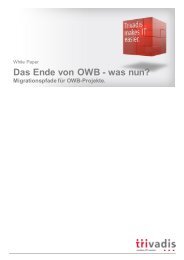phsjhxx
phsjhxx
phsjhxx
You also want an ePaper? Increase the reach of your titles
YUMPU automatically turns print PDFs into web optimized ePapers that Google loves.
5. Language Usage<br />
The language usage section is partly based on the rules defined within the tool CodeXpert<br />
by Quest Software (www.quest.com). All text taken directly from this source is marked by<br />
(CodeXpert). Every rule, that may be checked by CodeXpert ist marked with a red label<br />
including the rule number within CodeXpert.<br />
5.1. General<br />
1. Try to label your sub blocks.<br />
[CodeXpert 4403]<br />
2. Always have a matching loop or block label.<br />
[CodeXpert 4403]<br />
Reason: Use a label directly in front of loops and nested anonymous blocks:<br />
• To give a name to that portion of code and thereby selfdocument<br />
what it is doing.<br />
• So that you can repeat that name with the END statement of that<br />
block or loop.<br />
Example:<br />
-- Good<br />
BEGIN<br />
<br />
BEGIN<br />
…;<br />
END prepare_data;<br />
…<br />
END;<br />
<br />
BEGIN<br />
…<br />
END process_data;<br />
3. Avoid defining variables that are not used.<br />
[CodeXpert 6405]<br />
4. Avoid dead code in your programs.<br />
[CodeXpert 6801]<br />
Reason: Any part of your code, which is no longer used or cannot be reached,<br />
should be eliminated from your programs.<br />
5. Avoid using literals in your code.<br />
[CodeXpert 4602]<br />
Reason: Literals are often used more than once in your code. Having them defined<br />
as a constant reduces typos in your code.<br />
All constants should be collated in just one package used as a library. If<br />
these constants should be used in SQL too it is good practice to write a<br />
get_ deterministic package function for every constant.<br />
PL/SQL Coding Guidelines 17




